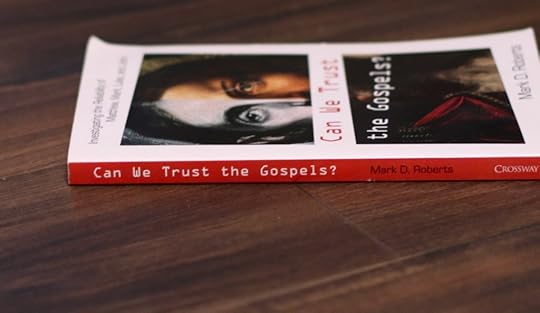Joe Fontenot's Blog, page 3
February 25, 2019
Control is easier, but not better
Continuing the episode in the garden, when Jesus was arrested.
When confronted, Peter pulled out a sword. And then he lunged.
Given what we know, it was probably a short sword designed for stabbing, not slicing. And so either Peter had bad aim, or his recipient was just quicker. Regardless, it appears Peter’s intention was to kill.
Peter stood there, assessing the situation, and decided he was ready to defend to the death, or go down fighting for his Lord.
But then, something curious happens. Verse 56 tells us: “then all the disciples left him and fled” (Matthew 26). That included Peter.
How does Peter go from ready-to-die to let’s-get-out-of-here?
It came because of what Jesus said in between the two events. In short: Put away your swords. I’m in charge here.
This, on the surface, seems like it would be a comforting message.
But it’s not that simple. As people, there’s a transformation that it takes for us to ‘get’ there.
What Jesus was really telling Peter and the others was: it’s time for you to give up control.
As the story plays out, we see that Peter’s not there yet. (Still to come are his three denials.)
For us, when we want to follow God, it’s tempting to believe it’ll be a lightning bolt situation. And, on the part of God, it is that.
But for our part, that’s far from the case. Theologians call this sanctification. It’s the process of growing into the role God’s carved out for us.
Of course, what that includes, by implication, is all the failing along the way.
The post Control is easier, but not better appeared first on Joe Fontenot.
February 22, 2019
“Friend”
At the moment of betrayal, Jesus said to Judas, “Friend, do what you came to do” (Matthew 26:50).
This, I do not think, is sarcasm or a social nicety. It was genuine.
Judas was one of the twelve Jesus chose.
He was included in those sent out on their inaugural training. He was in the boat when Jesus talked to nature (and it responded). And he saw the plethora of sick and hungry, both healed and fed.
He was special.
As readers, knowing how the story plays out and what Judas did, it’s easy to hate him. We’re supposed to. He’s the villain.
But God never saw it that way.
Later in Romans, Paul would write that we were all “against” God, “enemies,” when he decided to love us (Romans 5:8-10).
The story of Judas is very close to being the story of us all.
It seems, perhaps, this story is not about vengeance or poetic justice (Judas hated himself for what he did), but about love, and mercy.
Ours, that is.
The post “Friend” appeared first on Joe Fontenot.
February 21, 2019
The antidote to temptation
After finding them sleeping the first time, Jesus tells his closest three friends:
“Watch and pray that you may not enter temptation” (Matthew 26:41).
Pulling this out of context, it’s easy to conclude that prayer and alertness are the key to this issue.
And prayer certainly is.
Awareness, likewise, is valuable. But that’s not what Jesus was talking about.
The three were set to be a watch. To either stay awake and keep him company, or to watch for approaching visitors. Or both.
The point is, the work was active. Their job was to do it.
This is instructive for us today.
Prayer is vital–necessary–to resist temptation. But prayer in a vacuum isn’t enough. Jesus said, “the spirit indeed is willing, but the flesh is weak.”
The secret is that we begin to resist temptation when the two parts are in sync: when our prayers and our practices align. When we both pray and work.
The post The antidote to temptation appeared first on Joe Fontenot.
February 20, 2019
Spiritual growth at its essence
Jesus was never intimidated by those who could (and eventually would) kill him.
The same Jesus held command over all nature, not skipping a beat and multiplying food when people were hungry and hushing the waves when others were scared.
And, of course, his inauguration into ministry was shadowed the very Tempter himself. Even then, not a hair of his was out of play. Jesus was in command.
Yet…
When faced with the idea of being separated, even momentarily, from the father, he “fell on his face” and voiced: if only there was another way… (Matthew 26:39)
What moved Jesus at his core were not the external threats. As God, these were nothing to him.
Instead, what moved him was the internal. The fear of losing that most precious thing: harmony with the Father.
As I reflect, I’m afraid my fears are often all backward. I fear the external far more than I fear the internal.
I have come to understand that spiritual growth is the process of reversing this.
The post Spiritual growth at its essence appeared first on Joe Fontenot.
February 19, 2019
Sorrow to God
“He began to be sorrowful and troubled.”
-Of Jesus, hours before he died (Matthew 26:37)
I used to struggle with this idea: that God was anything like me.
God is all-powerful and all-knowing—he doesn’t laugh at jokes, and he certainly doesn’t cry when he’s mad.
And, maybe those things. Or maybe they’re not.
But what that idea misses is the point of relationships. To believe God doesn’t have emotions is to misunderstand half of what Jesus said and did on Earth.
When his friend Lazarus died, he did cry. The countless times he saw the poor abused, he was angry. And, undoubtedly, when he saw people, like the centurion, who displayed such great faith, act on that faith, he was happy and “marveled.”
The stoics among us–which I understand well–look for another explanation.
But the truth is, emotions are a thing to embrace, not conquer.
The post Sorrow to God appeared first on Joe Fontenot.
February 18, 2019
Can we trust the gospels?

If you don’t follow me on Instagram (which you can do here), then this is new. But each week, I put up a book about spiritual growth that’s a cut above the rest. And this week, I decided to put it on the blog.
(And you can see back issues on my recommended reading page here.)
This book came highly recommended. And it came after I’d read quite a few books about the historical accuracy of the New Testament. So I originally wasn’t quick to get it. And then I did. Such a wonderful book on the subject.
Mark Roberts lays out a clean and clear case (that doesn’t require a background in the subject) for questions like: How do we know what we have is the original? Why are the four gospels? And why do they differ in their accounts? He goes on and looks at other fundamental issues critics bring up.
If you have any questions about this, or are just curious, this is the place I’d recommend starting. Here’s the link to it.
The post Can we trust the gospels? appeared first on Joe Fontenot.
February 15, 2019
Was Peter’s promise worth it?
“You will all fall away because of me this this night,” said Jesus.
“Though they all fall away,” said Peter, “I will never.“
Directly, Jesus turned to him, “this very night…you will deny me three times.”
“Even if I must die with you,” said Peter, “I will not” (Matthew 26:31-35).
And then, of course, he does all of it.
After it was over, Jesus came to him and talked him through it. He wasn’t hard, but he was direct.
Peter (John writes) “was grieved” by the end of it.
But with each question Jesus asked, he finished with statements of affirmation. Jesus—despite Peter’s performance—still had a plan, a job, and most importantly, a love for him.
By the end of that conversation, Jesus had reinforced this almost a half dozen times.
Even with the broken promises, and, perhaps, because of them, Peter knew himself and his status with Jesus all the more.
So, I’d say…yes, is the answer to that question.
The post Was Peter’s promise worth it? appeared first on Joe Fontenot.
February 14, 2019
On the passover, the last supper, and extra helpings of ignorance
Today, the Lord’s super is a time of reflection. We dwell on who he is, who we are, and what he did for us.
But the original one wasn’t like that. It wasn’t even ‘the Lord’s supper.’ It was the passover, a thousand-year-old tradition.
Later that original night, they would go to the garden to pray, but his closest followers would fall asleep in the process.
They had no idea what was coming. The mob, the fake trial–watching Jesus actually die.
And yet, that passover (the Lord’s supper) was for them. And for us.
It’s a privilege to be able to reflect.
But what’s even more amazing is all that God has done for me (and for you).
And he’s often doing while we fall asleep in the garden, without a clue about the bigger picture unfolding around us.
If we want to see it, that’s the picture of a good God. The loving father. And our consummate provider.
The post On the passover, the last supper, and extra helpings of ignorance appeared first on Joe Fontenot.
February 13, 2019
Joy is (not) always joy
Jesus himself said, “I have not come to bring peace, but a sword” (Matthew 10:34).
While we look forward to a world restored, we know that today is not yet that world.
What will one day be a joy for many, will at the same time be a terrible anti-joy for so many more.
This matters, because it’s our job to spread that same joy.
The joy so many view as hostility.
Paul, knowing of this, called us to the “ministry of reconciliation” (2 Corinthians 5:11-21).
Put another way, the gospel is only ‘joy’ or good news to those who have given their lives over to it.
To the rest, the world at large, it’s bad news.
And so our job, the ministry of reconciliation, is to make friends with the world, so that they can see—really see—the good news after all.
The post Joy is (not) always joy appeared first on Joe Fontenot.
February 12, 2019
The question for security
Jesus, at the last supper, speaking very plainly to his disciples, says: “One of you will betray me” (Matthew 26:21).
There were two reactions from the group.
First, they became agitated and “very sorrowful.”
Then, they wanted a resolution. One by one, they confront the problem: “is it I, Lord?”
What we know as the reader, is that it was Judas. If Judas played either of the two cards above, it was a facade.
The rest, however, were being genuine.
If they were going to do this terrible thing, they assumed it must be some kind of ignorance or foolishness, something they could fix, and so they sought to better understand.
This is telling.
The true believers seeks unity with God. That’s the role of the Spirit in our lives.
Sometimes it’s easy to reflect and wonder, with all this mess in my life, am I really one of his?
The thing to remember, is that those who aren’t his don’t want the answer to that question.
But those who are, for them, for us, that answer only bring peace.
The post The question for security appeared first on Joe Fontenot.



